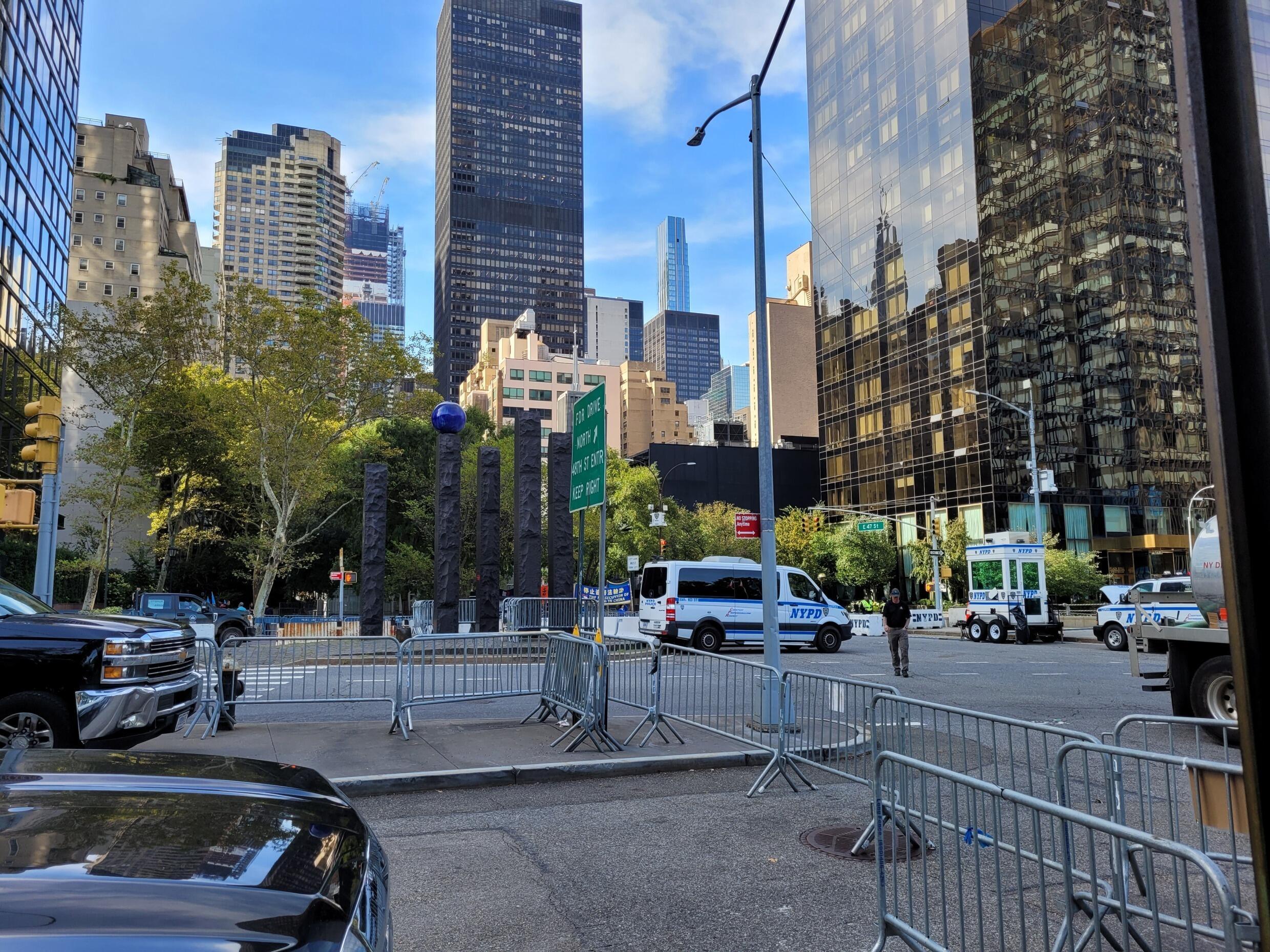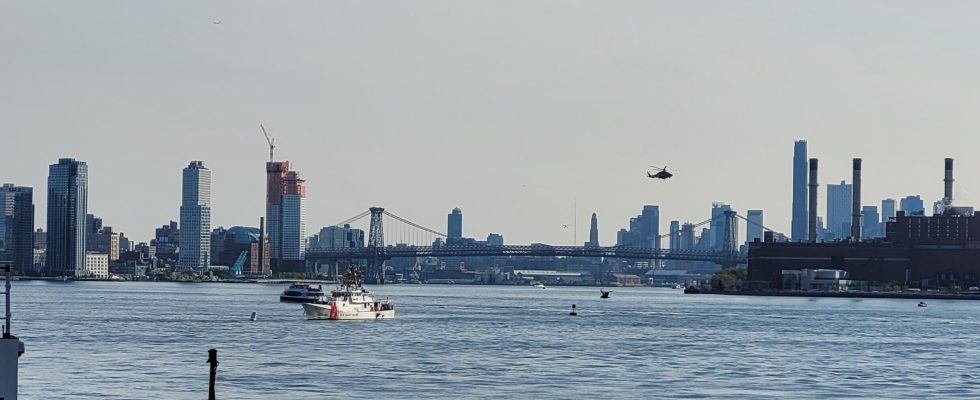Heads of state from around the world have been attending the United Nations podium in New York since September 19 for the organization’s 78th General Assembly. The Glass House is the place of all attention, but also of all fear. It must be said that many stories are told about this strategic place in more than one way.
From our special correspondent in New York,
Helicopters hovering at low altitude, even circulating halfway up buildings, Coast Guard boats running along the East River, thousands of NYPD police officers but also soldiers from the United States Marshals Service (USMS), snipers on the roofs, American intelligence men, dozens of streets around First Avenue blocked off… the United Nations headquarters could not be better protected during these times of the Annual General Assembly. Protected against possible terrorist attacks or large-scale demonstrations. Maybe less against espionage…
Since the beginning of the construction of the Glass House, just 70 years ago (the building was inaugurated in 1951) on a site until then made up of slaughterhouses, industrial installations and docks, the most fantasies Crazy people are circulating on this subject within the gigantic Turtle Bay complex in Manhattan. How can we not think about it when we know that the heads of state of the planet meet there to decide on the course of the world. Some say that microphones were placed in the walls as soon as it was built, that strange noises arise in the telephones of journalists and diplomats when they are in conversation and that it is preferable, in order not to be spied on, to speak face to face. -face to face or outside the three main buildings: the secretariat (a 39-story tower), the General Assembly and the Dag-Hammarskjöld library.
Although the UN says espionage activities within it are illegal under a number of international treaties, including the 1946 Convention on the Privileges and Immunities of the United Nations, the 1947 UN Agreement United States and the United States, or even the 1961 Vienna Convention on Diplomatic Relations, one thing is certain: the place is regularly described by the diplomats who work with it as a “ nest of spies ”, in the words of Russian defector Sergei Tretyakov.
A more than predictable espionage…
While rumors are rife, some have turned out to be true. “ Roosevelt, and then Truman, wanted to locate the UN headquarters in the United States, believing that this would engage the American people and thus encourage the Senate to ratify the UN charter. But once other UN member states agreed, the United States realized that people from the communist East were coming to American soil and that there would be spies among them. “, says Loraine Sievers, who was a UN staff member for almost forty years, working in three departments before becoming head of the Security Council secretariat.
“ The Americans were very worried at the time, they knew that it was easy to pass documents, for example, discreetly within the Glass House. So already, they were asking some of their citizens to “work for them” and of “look at what people were doing”. » Loraine Sievers also explains the boon that a United Nations headquarters located in the United States represented, at that time for the Soviets, to collect information on “the West”. A boon, but also a source of concern: defections were numerous, and the fear of seeing certain agents being “turned over” by the Americans was real and well-founded.

In the midst of the Cold War, espionage affairs between the Americans and the Soviets abounded within the UN. In the 1970s, for example, the “Lemon Aid” boom exploded: the FBI used a double agent to flush out the Soviets and learn their techniques. At this time, the Americans suspected the Soviets of using their office at Turtle Bay to spy on US Marine operations in New York and New Jersey. There are many anecdotes like this. Loraine Sievers, in office since 1974 and who still today provides training to interested new members of the Council, compiled several of them in a novel, of more than 300 pages, entitled An UNwilling Spy: A Cold War Novel Set at the United Nations (An unwilling spy: a novel about the Cold War at the United Nations). “ The main character has my experience, but it’s a novel… », she slips, smiling from the corners of her lips.
One day, Peggy, a friend of Anne, the main character of “An UNwilling Spy”, is walking in Central Park, in a very isolated place, and by chance comes across two people from the UN whom she recognizes and whom she recognizes. she sees exchanging a document. She is then terrified that they might have seen her and that she is now in danger. She does not tell Anne who any of these men are. Anne understands that it didn’t surprise Peggy to see a Soviet man involved in a clandestine Cold War meeting, but what frightens her must be the identity of the other man, because he must be a Westerner and Peggy knows now that he has started working for the Russians.
“ Yes, in fact, things were happening within the UN, people were unsure of their colleagues », confides Loraine Sievers, choosing her words. For example, exchanges of documents between members of the UN in remote locations in Central Park, or even an East German, considered close to the KGB, who during an evening admitted to having been sent to New York to seduce a young woman from the West working at the General Secretariat and apologizes for it…
“ From morning until evening, this building is bombarded by intelligence from all countries! »
But the end of the Cold War did not put an end to espionage, quite the contrary. “ From the first day I entered the UN, I was told: “Be careful, your office is bugged, your residence is bugged” “, confided former UN Secretary-General Boutros-Ghali to the BBC in 2004. “ There was ample evidence that we were constantly being monitored. If there was something sensitive to discuss, I would go to the cafe in the basement of the UN where it was very noisy or I would go for a walk in Central Park », Testifies on the same channel Richard Butler, former chief weapons inspector in Iraq.
Then with new technologies, business multiplies. Among them, the revelations in 2003 by the American press about the NSA which undertook an aggressive surveillance operation (interception of personal and professional telephones, emails) of UN delegates in New York in order to provide American officials with last minute information on the voting intentions of UN members regarding Iraq.
“ The period “Oil for food” was a long period of suspicion within the UN between the British and the Americans on one side, the Russians, the French and the Chinese on the other “, remembers Loraine Sievers. The suspicions arose because the two sides had very different positions on how the program should work. Until in 2004, revelations emerged: the Secretary General of the United Nations himself, Kofi Annan, was being listened to by the United Kingdom. The reaction at the UN is rather timid, which, according to the New York Times of the time, could be a form of recognition that wiretapping at the United Nations is as old as the institution itself.
“ In 2006, says Loraine Sievers, piles of electrical wires hung below the desks. A technician came regularly to check whether or not there was radiation. He told me that under mine everything was fine. Then he went to the window with his wave detector and there, his machine took off and went completely crazy! He told me : “here is the real risk, from morning until evening, this building is bombarded by intelligence from all countries!” »

In 2010, Cypriot intelligence services allegedly stole 6,500 UN documents containing sensitive information about its negotiations with Turkish Cypriot leaders. In 2012, Reuters revealed Ban Ki-moon’s 28-page report on Western Sahara. The document contains a series of criticisms addressed to Morocco, the UN Secretary General even suggests that Rabat spied, at least once, on the United Nations Mission for the organization of a referendum in Western Sahara (Minurso) . In 2013, the German daily Der Spiegel cites secret documents from whistleblower Edward Snowden which reveal that during the summer of 2012, NSA experts managed to break into the UN videoconferencing system and break its code.
Closer to us, in March 2022, in a context of strong American-Russian tensions linked to the war in Ukraine, the United States announced that it had asked the UN for the departure of a “aRussian intelligence officer working » within its general secretariat. The latter would have, according to Washington, “ abused his residency privileges in the United States “. A few days before this story, the Americans had decided to expel twelve members of the Russian diplomatic mission to the UN for espionage.
“ Yes, espionage still exists at the UN, but through other means and for other purposes », continues Loraine Sievers, forcing us to change certain habits: diplomats are in fact using more and more VPNs or cryptography software to communicate with each other at the United Nations. “ At the UN, everyone has always distrusted everyone. » And that’s not about to change.
